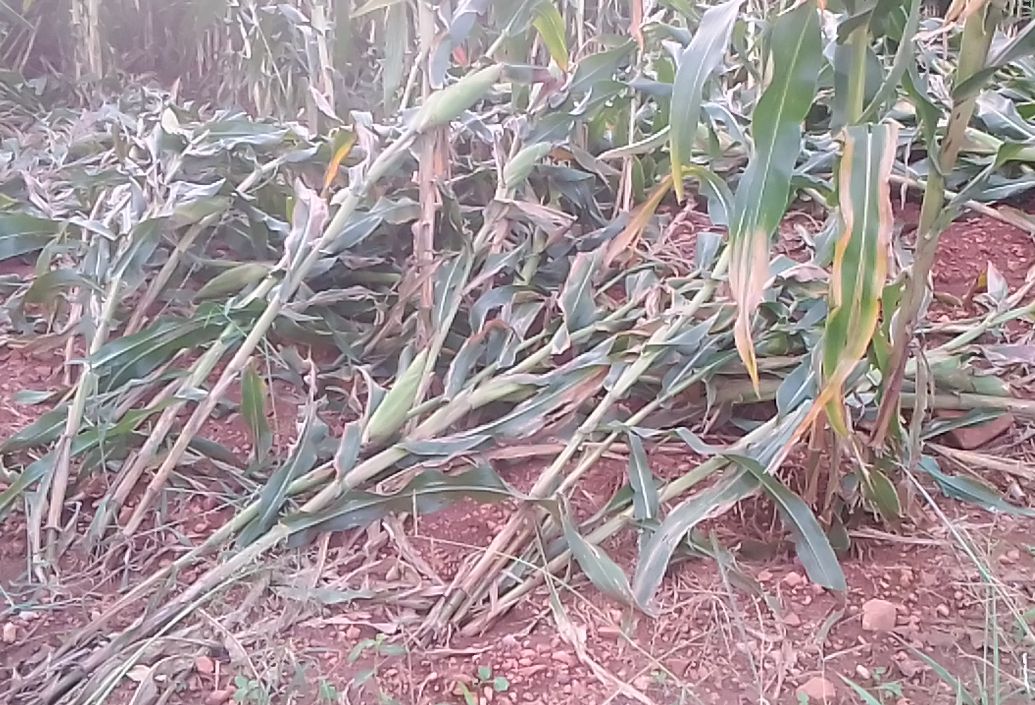|
Getting your Trinity Audio player ready...
|
By Elvis Dumba
Banket – It looked coincidental that on the day the country joined the rest of the world in commemorating World Health Day running under the theme ‘Our planet, our health ” which focuses on climate change, farmers in Mapinga and Banket were counting losses following heavy rains that fell on the day destroying crops on the way.
The yield from farms of peri-urban farmers in Banket is expected to go down following torrential rains that damaged maize fields.
“I was expecting a good yield from my climate-proofed three-hectare maize field but all the maize is on the ground now following the windy rains. I don’t know what to do now as the maize still needed about two weeks to be firm,” Taurai Bosha of Banket said
The windy heavy rains that affected some parts of Mapinga and Banket plunged the town into darkness with home rooftops being blown away and luckily there were no causalities.
The incident openly testified to the changing weather patterns where rain seasons are becoming more violent than before.
“I was happy with the current rains. I had delayed planting my maize thinking that the rains we are getting will help. My 2-hectare field was blooming but the rains we got which were so windy and terrifying destroyed all the hopes for a bumper harvest as the whole field was affected, ” Sheila Butawo said
The World Health Organisation (WHO) chose to link climate change with health issues as the crisis is the single greatest health threat to humanity – contributing to environmental risks with Zimbabwe not being spared from devastating impacts of climate change such as the heavy rains that fell in Banket, floods, cyclones, and droughts.
As Zimbabwe joined the rest of the world in commemorating World Health Day, the government said climate change challenges stall development.
“Climate change has the potential to stall the country’s development, pose a serious risk to food security, health, and adaptive capacity,” Deputy Minister of Health and Child Care Dr. John Mangwiro said.
For Banket residents some with late-planted crops, torrential rains on World Health Day are going to affect their yield. The hailstorm also affected the electricity supply as various electricity poles fell. Women and children now face the dilemma of fetching water from boreholes and other sources located far away as the piped water supply was also affected.
UNICEF urged risk-informed policies that promote children and climate at the centre of national strategies.
“As extreme weather events increase in frequency and ferocity, this has an impact on access to water, food, and has implications for the nutrition of children,” Tajudeen Oyewale, the UNICEF Zimbabwe representative said.
The World Health Organisation has been calling for more investment in climate change mitigation systems to combat the climate change crisis.
“There is a need for increased funding to mitigate these effects of climate change and protect the vulnerable which will contribute to building better populations,” Dr. Alex Gasasira, the World Health Organisation country representative said.
If the world fails to upscale activities for combating climate change, scenarios such as what happened in Banket as a result of heavy and windy rains will continue to be experienced with the average annual temperature expected to rise by 3% before the end of the century as annual rainfall is expected to decline more and more with droughts, cyclones, and floods expected to increase.






